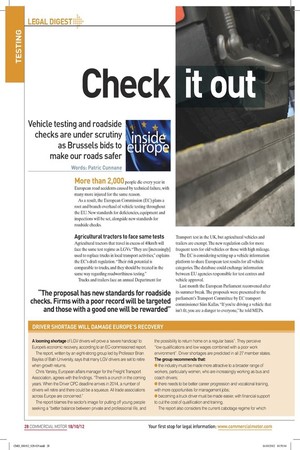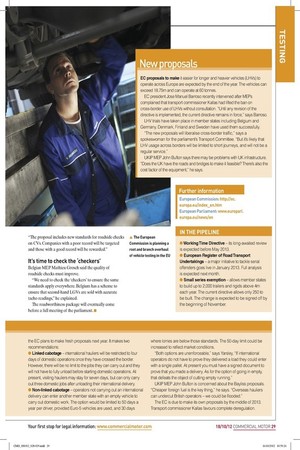DRIVER SHORTAGE WILL DAMAGE EUROPE’S RECOVERY
Page 21

Page 22

If you've noticed an error in this article please click here to report it so we can fix it.
A looming shortage of LGV drivers will prove a ‘severe handicap’ to Europe’s economic recovery, according to an EC-commissioned report.
The report, written by an eight-strong group led by Professor Brian Bayliss of Bath University, says that many LGV drivers are set to retire when growth returns.
Chris Yarsley, European affairs manager for the Freight Transport Association, agrees with the findings. “There’s a crunch in the coming years. When the Driver CPC deadline arrives in 2014, a number of drivers will retire and there could be a squeeze. All trade associations across Europe are concerned.” The report blames the sector’s image for putting off young people seeking a “better balance between private and professional life, and the possibility to return home on a regular basis”. They perceive “low qualifications and low wages combined with a poor work environment”. Driver shortages are predicted in all 27 member states. The group recommends that: • the industry must be made more attractive to a broader range of workers, particularly women, who are increasingly working as bus and coach drivers; • there needs to be better career progression and vocational training, with more opportunities for management jobs; • becoming a truck driver must be made easier, with financial support to cut the cost of qualification and training. The report also considers the current cabotage regime for which the EC plans to make fresh proposals next year. It makes two recommendations:
• Linked cabotage – international hauliers will be restricted to four days of domestic operations once they have crossed the border. However, there will be no limit to the jobs they can carry out and they will not have to fully unload before starting domestic operations. At present, visiting hauliers may stay for seven days, but can only carry out three domestic jobs after unloading their international delivery.
• Non-linked cabotage – operators not carrying out an international delivery can enter another member state with an empty vehicle to carry out domestic work. The option would be limited to 50 days a year per driver, provided Euro-5 vehicles are used, and 30 days
where lorries are below those standards. The 50-day limit could be increased to reflect market conditions.
“Both options are unenforceable,” says Yarsley, “If international operators do not have to prove they delivered a load they could enter with a single pallet. At present you must have a signed document to prove that you made a delivery. As for the option of going in empty, that defeats the object of cutting empty running.” UKIP MEP John Bufton is concerned about the Bayliss proposals. “Cheaper foreign fuel is the key thing,” he says. “Overseas hauliers can undercut British operators – we could be flooded.” The EC is due to make its own proposals by the middle of 2013. Transport commissioner Kallas favours complete deregulation.











































